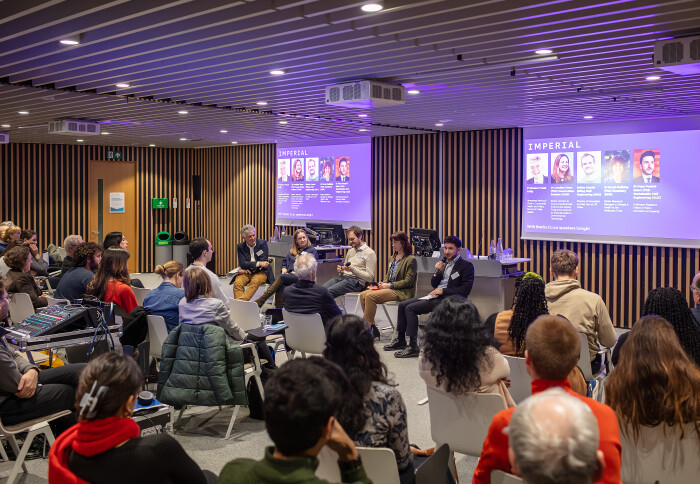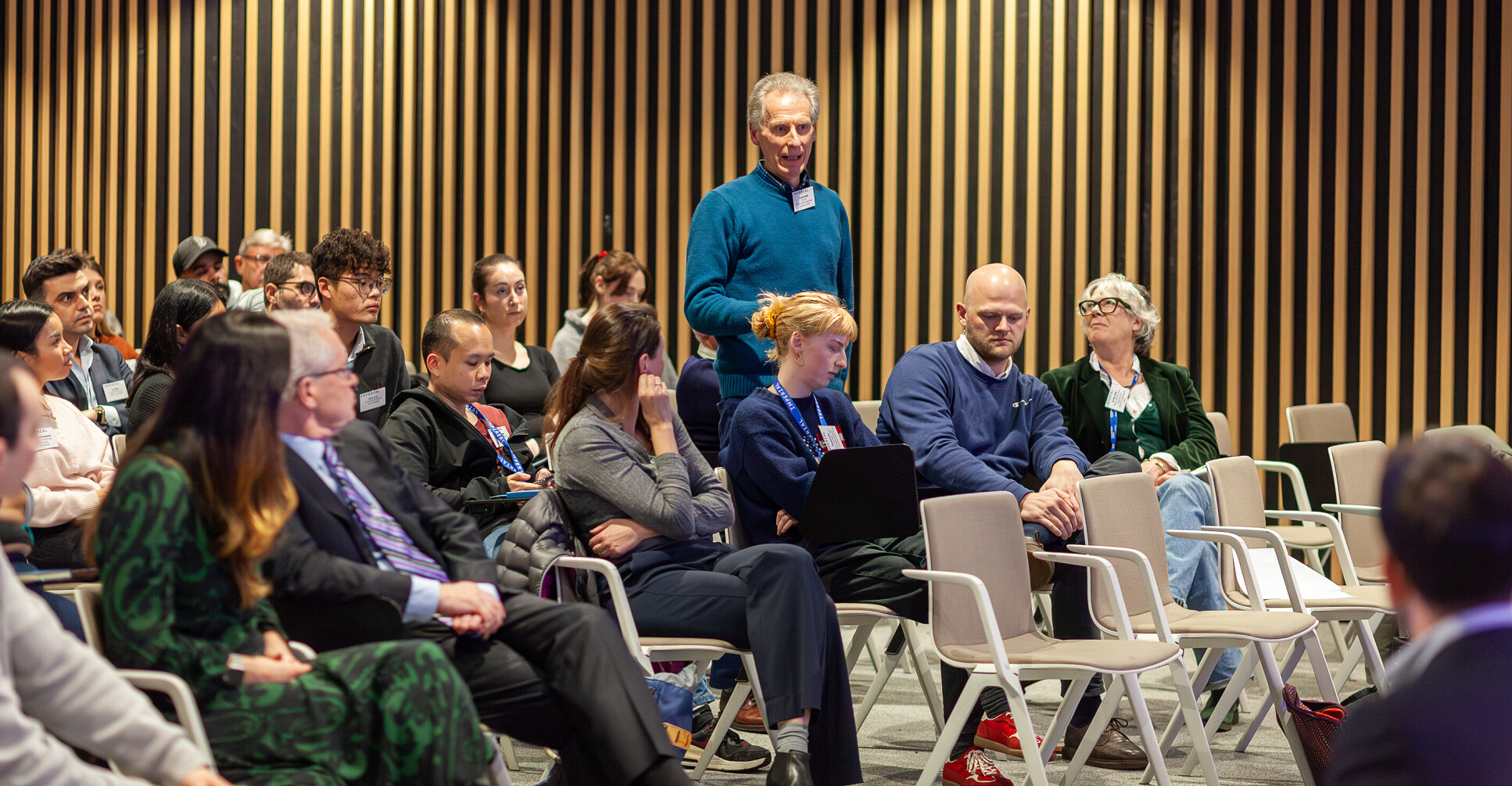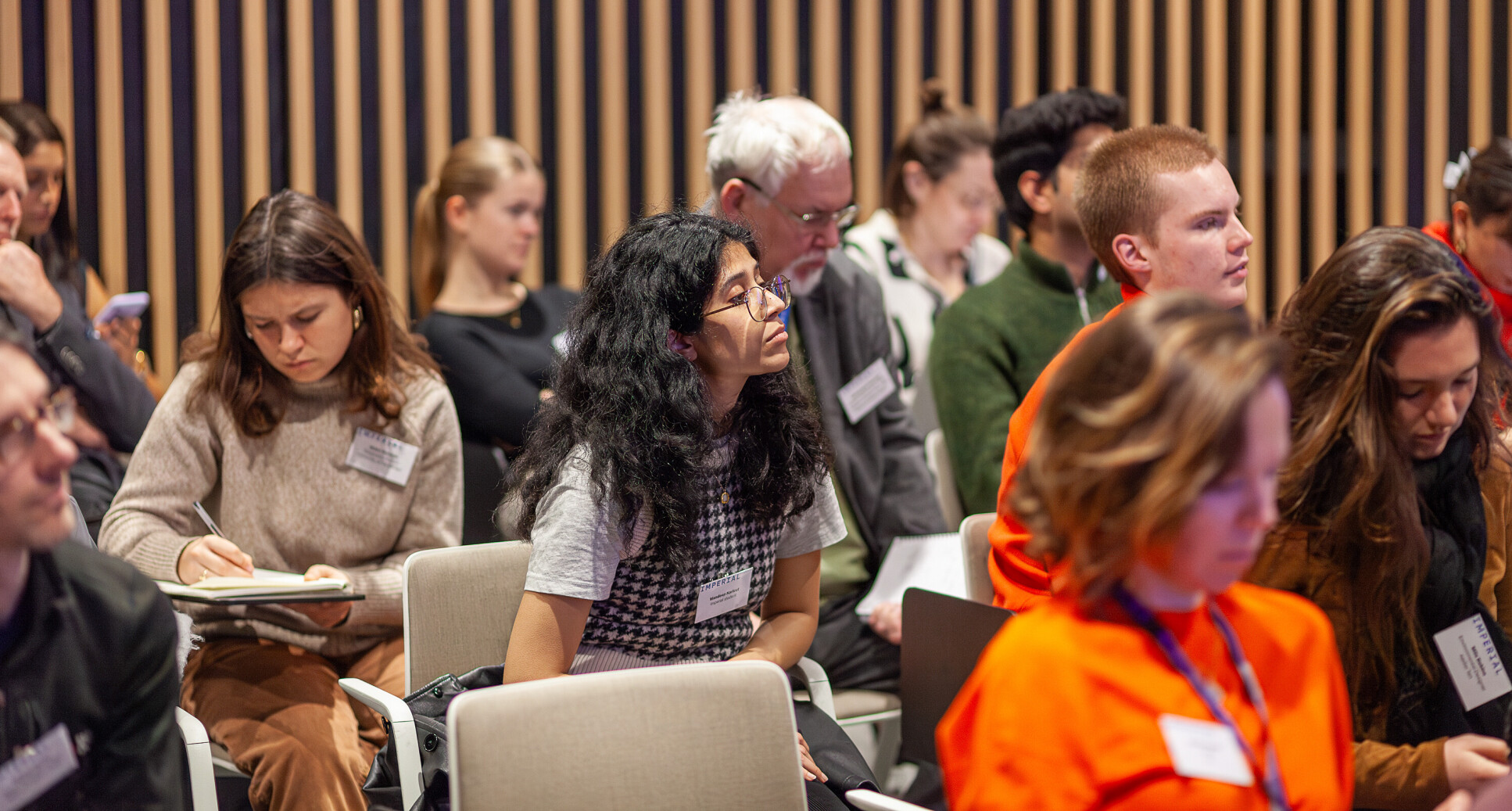Imperial alumni design the sustainable city of the future
by Jenn Rowater

How do we design cities that are healthy for people as well as healing for the planet? Alumni sustainability experts explore the future of our cities.
“Not just world-leading, but world-changing"
Alumni Insights events provide a platform for Imperial’s community of students, staff and alumni to learn from each other and collectively explore new perspectives and pathways for innovation. This event was the tenth in the series, and marked the start of a new focus on Imperial’s Schools of Convergence Science.
Welcoming guests, President Hugh Brady noted that Imperial’s strategy is to be “Not just world-leading, but world-changing.”
“Imperial does multi-interdisciplinary research, and what is increasingly called ‘convergence science’, at scale, better than any other university. Our Schools of Convergence Science will enable us to take it to another level.
"Convergence science recognises that for many of the problems facing humanity, the current research models don’t work. It challenges us to work across disciplines to not just learn each other’s language and research methodologies, but where they are not sufficient, to design new ones.”
The new Schools will enhance Imperial’s research capacity, visibility, talent attraction and funding in the areas of climate and sustainability, human and artificial intelligence, health and technology, and space and security.
“We are looking to be best in class as a university in terms of climate, sustainability and environmental science... There is no topic our community is more passionate about.” Professor Hugh Brady, President, Imperial College London
The future of our cities in a changing climate
We know an increasing amount about what is not sustainable. But what is? What does sustainability mean in the context of cities and for those who inhabit them?
As urban populations continue to grow, the challenge of building liveable cities has never been more important.
Chairing the discussion was world-leading expert in air pollution research, Professor Frank Kelly, Humphrey Battcock Chair in Community Health and Policy at Imperial’s School of Public Health.

Frank was joined by a multidisciplinary panel of alumni with both academic and industry experience spanning infrastructure, design, engineering, human health and the environment:
- Balázs Csuvár (MEng Civil Engineering 2014) is the Director of Innovation and Net Zero at DG Cities where he develops smart city strategies with a focus on connected and autonomous mobility and enhancing the capacity of local governments.
- Dr Caroline Howe (MSc Environmental Technology 2005, PhD Conservation Science 2009) is a Senior Lecturer in Environmental Social Science at Imperial. Her interdisciplinary research focuses on exploring the relationship between people and nature, and how these relationships influence the success of sustainable development policies.
- With a background in both architecture and environmental engineering, Dr Pepe Puchol-Salort (PhD Sustainable Civil Engineering 2023) brings over ten years of industry experience to the panel. As Hoffmann Research Fellow in Water Innovation at the World Economnic Forum and Imperial, Pepe focuses on urban sustainability, integrated water management and climate adaptation across global cities.
- Senior Research Manager in Climate & Health at the Wellcome Trust, Dr Sarah Holliday (PhD Chemistry 2016) aims to drive transformational climate action at scale by supporting the government to design more evidence-based, collaborative policies to tackle climate challenges.
Key takeaways
Design

The health and wellbeing of both people and the planet need to be factored into city design.
Caroline: “We still focus on cities as a place where everyone has to go to make money. Actually, four out of six people now live in a city. They are our homes, so how do we make them homely? We have all the evidence we need that greener cities are better for our mental health, reduce air pollution and balance the heat effect of living in a city. Even just planting a row of trees along a street can lead to a huge improvement in wellbeing. We need cities where we can enjoy being outdoors, have playgrounds for our children, where we can walk and cycle safely. We need to focus on these co-benefits of nature-based solutions.”
Behavioural change

It’s behaviour, not technology, that is a barrier to more sustainable cities.
Balázs: “Technological innovation isn’t what we need now. The innovation we need is in how we talk to people, the governance, procurement, funding and financial structures surrounding the technology, and how we get behavioural change so that more of that technology is being taken up. Imperial’s approach to convergence science is interesting because it’s clear that the reason we’re not doing these things already is not the technology - that already exists. So why aren’t we using it? Because of all the other issues around it. For the science and engineering community, the question becomes ‘how can we help people to adopt these solutions?’. Instead of designing something and telling people they should use it, how can we design something that people have asked for?’”
Individual behaviour can influence big change.
Caroline: “Individual behaviour makes a big difference. Look at free range eggs as an example. Nearly all eggs and chicken you can buy now are free range – because the population went to a supermarket and that’s what they chose to buy. That choice puts pressure on the companies and the farmers to provide what people want. You can influence things through bottom-up behaviour change and nudge theory. If enough individuals decide ‘I want to cycle my bike’, the pressure will build up."
Policy

Ideas aren’t enough without the right policy in place.
Pepe: “It’s very important to create an enabling environment which cuts across all levels, bottom-up as well as top-down. We might have entrepreneurs and innovators at the lower level who have some financing from investors but they don’t have the policy support. Without political support it would be very difficult to develop the partnerships they need.”
A holistic approach
If we don’t look at the big picture, a solution might make something else worse.
Pepe: “If we want to tackle all these issues and challenges, we need to understand how an issue like energy overlaps with water consumption or biodiversity or air quality or any of the other things that we are facing in our cities. If we don’t look at the nexuses it will be much more difficult and our solutions might cause unintended consequences for other sectors or disciplines. If we try to tackle the complexity, even if it’s more difficult, at the beginning, then the solution and the outcome will be more productive and useful.”
Community engagement

We need to empower communities with knowledge and agency.
Sarah: “Communities should be involved in every aspect of city design and implementation. You can inform and empower people with citizen science - generating evidence of air pollution for example - and people will better understand the impact of environmental changes on their local area, their own health, their children’s health and their community’s health. City design is complex, there are so many different social, political and financial structures of governance. But the more you empower communities with the knowledge and capacity to take things into their own hands, the more they demonstrate that you can start with one thing – maybe you managed to raise social investment to put a solar panel on your tower block – and then you realise that you’ve come together as a community and now you have the relationships and structures in place. We can then mobilise ourselves and our neighbours to do more and to go bigger, but you also need the political enabling environment around this to enable rather than block progress.”
Co-designing infrastructure with the community ensures longevity.
Pepe: “When you involve a community, they can help you test your design. If you give them access to user-friendly data driven tools, they can test different scenarios for you and really understand the implications of them. You can ask people what difference a design would make for their neighbourhood. They will be much more able to accept it and introduce it into their local environment, and much more proactive in maintaining it.”
Transport
The future of city transport is electric.
Balázs: “In 20 years, people are probably going to be moving around cities in a way that is very similar to today. Especially in large cities like London, we will still be reliant on fixed transport routes. The battle to get people to use fewer cars will still be happening – it's not easy to change without a massive overhaul of infrastructure and really supporting people to do it. Behaviourally, people don’t really want to give up their own cars, so I think the main difference will be the move to electric vehicles.”
We can adapt concepts to suit our context.
Caroline: “Low-traffic neighbourhoods have been shown to work very well. The co-benefits drive it – it’s much safer to walk, much safer to cycle, and better for air pollution. It’s a very cheap innovation so governments and local authorities are happy to implement it. Mega cities are a different setup – you'll have people at the outskirts who will need to commute in for work so you need a mass transport system for that. But you also have much smaller cities which you can make into greener, 15-minute cities. We can’t do that with London as a whole but you can do it within boroughs. We have models that show it works, so political will is the driving force.”

Energy
It’s all about location, location, location.
Sarah: “Energy production depends a lot on context. For our weather and climate in the UK, generating wind power offshore probably makes a lot more sense than trying to generate solar in cities like London. But we need a whole suite of technologies to deploy in the right context.”
We need a consistent message and funding to drive the change.
Balázs: “The trends show a movement towards the UK becoming fully electric but there’s no overall consistency, for example on heating changing over to electric, because we haven’t seen any governmental push for that to happen. If there’s government funding, people will do it and businesses will be set up to support it. Without that, it’s really all talk. As well as the funding, it’s also about the strength of the messaging. If they came out and said the UK is becoming fully electric, that would be enough for the industry to take a massive turn. It could be UK-based companies electrifying the UK system, supplied by UK generators.”
Housing
The housing we have doesn't work with the climate we now live in.
Caroline: “The problem we face in the UK is old housing stock. Our houses are not built for a changing climate. We lose heat about three times faster in the UK than Norway, so for example a study has shown that UK homes lose around 3 degrees every five hours, whilst Norwegian homes lose 0.9 degrees in the same time. We’ve had very hot, dry summers in some parts of the UK, and in other parts very wet summers. We’re going to have to retrofit our housing stock, to make it suitable for living in the changing climate conditions. We also need more housing, and there are two options. We can build on land that is already used, but not for housing. It’s more expensive because you’ve got to clean out what’s there and make it suitable for living but in the long term you’ll be using that land not just leaving it derelict. Unfortunately, the fastest way to do it is to build on green belt land but that’s a risk – what are the knock-on effects for biodiversity and food production?”
We need to design homes that suit the way we live.
Pepe: “As well as the volume and structure of housing, we need to consider policy approaches that support our social structures and how we live in our homes. A lot of people only use part of their homes – is our current design approach actually suitable for the family model that we have now?”
It’s important to address equity and provide climate resilient housing for all.
Sarah: “In many cities like London, often the poorest people live in least well-adapted housing, for heat in particular. We’re going to experience more of that extreme heat in London and around the world, as well as more flooding like we saw in Valencia, so we need to ensure that our future housing situation is more equitable and adapted to the future climate.”

Words of wisdom for the next generation
With students and recent graduates in the audience alongside more experienced alumni and staff, attention turned to the future of the field and the next generation queuing up to join the effort.
Sarah: "For anyone thinking of moving into a career in this area, please, please do! We are on a concerning trajectory for the climate. We need everyone to help with not just sustainable cities but resilient cities. Please come and help us out. We need every hand on deck."
Pepe: "Think about multidisciplinarity rather than being so focused on one area. Keep an open mindset and learn how to communicate complexity in a simple way.”
Balázs: "Optimism can be eroded, leaving you cynical, but that optimism is needed. Be curious about why certain things may not work. When thinking up solutions, consider the building blocks and people who ought to be involved. Join forces with those from outside of your field."
Caroline: "It is important to see cities as a social and ecological system. Biodiversity has to be a fundamental part of sustainability. We've done some great things as a human race. We haven't achieved everything yet, but it is possible and we can work together."
Hope for the future: a showcase of solutions
Alumni founders from three startups joined guests after the panel session to showcase technology that can integrate with city infrastructure to offer real world solutions.
Monitoring community health
Dr Claire Trant (PhD Materials 2020) is the co-founder of Untap Health. Their multi-patent-pending device can be installed by any community to monitor their health in real-time, using outgoing sewage. A single device can monitor multiple pathogens and can detect one infected person in 10,000 healthy people with 95% sensitivity and 99% specificity even if a person is asymptomatic.

Harnessing energy from transport
Anjali Devadasan and Yu Gu (MEng Materials Science and Engineering 2024) are the co-founders of Treeva. Their turbines make use of readily available land to generate renewable energy from the turbulent airflow of passing transport as well as the windy weather, for a renewable energy solution which is predictable, reliable and efficient.

Removing city pollutants from our oceans
Summer Chen, Henry Parkin, Hunaid Nagaria and Adhesh Shenoy (MSc Innovation Design Engineering 2023) are the co-founders of Guerrilla. When it rains, the debris of human activity washes away from our impervious built environment and roads into water bodies untreated, damaging aquatic ecosystems and human health. Guerrilla’s technology extracts contaminants while fitting into the current maintenance regime of cities.

What next?
This event marked the tenth in our Alumni Insights series, which aims to inform, inspire and connect the Imperial community around the themes of Imperial’s Schools of Convergence Science.
The next Insights event will take place in early February 2025, and will continue the conversations taking place at the World Economic Forum in January on sovereign AI.
- Sign up to our events emails to be the first to hear about this series as it develops.
- Let us know if you’re interested in speaking at a future event about sustainability, AI, MedTech or space.
- Explore the full package of benefits for Imperial alumni, including online webinars, access to online library resources, a book club, alumni email address, careers support and professional development, and more.
- Activate your Imperial Plexus membership, our free online community platform for alumni where you can connect directly with other alumni, collaborate and access online benefits.
Want to work with Imperial’s amazing alumni community?
Get in touch with the Alumni Engagement team to discuss your ideas.
Article text (excluding photos or graphics) © Imperial College London.
Photos and graphics subject to third party copyright used with permission or © Imperial College London.
Reporter
Jenn Rowater
Advancement